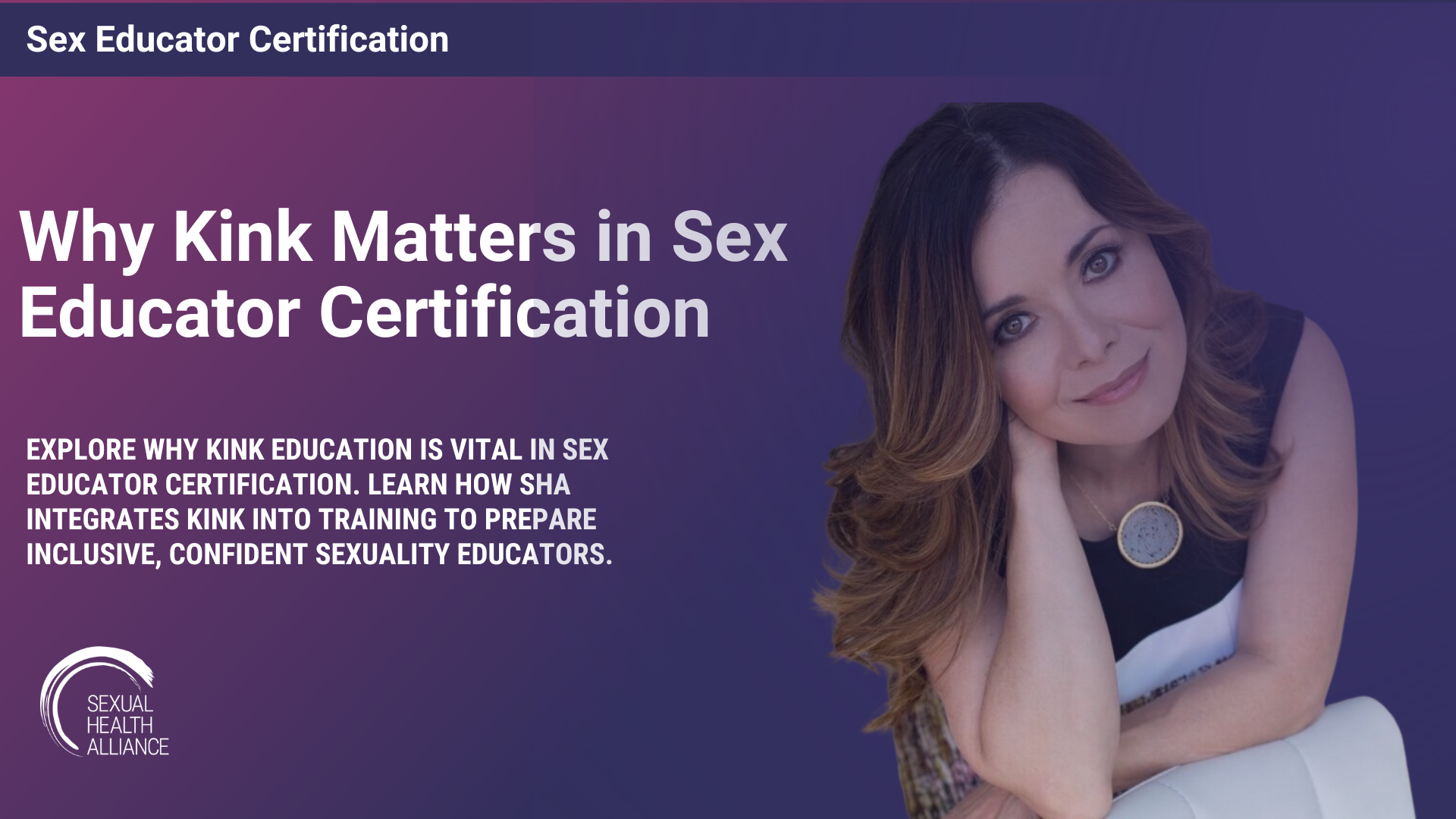Kink is an essential topic in sex educator certification. Midori and the Sexual Health Alliance emphasize that kink is not solely trauma-driven, but a diverse and normal part of human sexuality. Understanding kink helps sex educators reduce stigma, provide safe exploration tools, and foster inclusive learning. Conferences like SHA’s Nonvanilla Weekend and Annual Conference in Denver offer unique opportunities for hands-on learning and community building.
When pursuing a sex educator certification, one of the most important yet often overlooked areas is understanding kink. Too often, professionals enter the field without adequate knowledge of BDSM, dominance and submission, or the diversity of kink motivations. Yet, as Midori—a renowned sexuality educator and keynote presenter for the Sexual Health Alliance (SHA)—points out, kink is central to many people’s sexual expression and well-being. For educators to serve their communities effectively, they must move beyond myths and assumptions, embracing kink as an integral part of comprehensive sexuality education.
Busting the Myth: Kink and Trauma
A common misconception is that all kink stems from trauma. Midori stresses that this is not the case. While some individuals may process past experiences through kink, research shows that kink motivations are varied, nuanced, and often unrelated to trauma. People engage in kink for pleasure, self-discovery, intimacy, stress release, creative expression, or spiritual connection.
For those pursuing sex educator certification, this distinction is crucial. When educators assume kink is trauma-driven, they risk pathologizing their students, clients, or communities. Instead, a trauma-only narrative must be replaced with a science-informed, open, and affirming approach that validates the full spectrum of human sexual expression.
Why Sex Educators Must Understand Kink
Meeting Students and Clients Without Bias
Kink appears in classrooms, counseling sessions, and community discussions. A sex educator who is uninformed—or worse, judgmental—risks alienating learners and perpetuating stigma. Certification programs prepare educators to confront their own assumptions and provide tools for discussing desires without shame.
Empowering Safe Exploration
Midori emphasizes practical tools for navigating desire. Educators who understand kink can help students and clients articulate what they want, negotiate boundaries, and engage in play that is both consensual and safe. By fostering empowerment and agency, sex educators support healthier relationships and more confident sexual expression.
Building Interdisciplinary Bridges
The Sexual Health Alliance highlights the importance of cross-disciplinary networking. Sex educators, therapists, medical professionals, and researchers all bring unique perspectives to sexual health. SHA’s annual conference and Nonvanilla Weekend showcase how collaboration breaks down silos, creating a stronger and more connected field. For professionals earning certification, these opportunities are invaluable for both learning and networking.
Kink Education in Practice: Lessons from Midori
Reframing Humiliation and Embarrassment Play
Humiliation play is often misunderstood. Midori offers a psychological model that reframes it as a pathway to resilience, creativity, and even healing. In her teaching, humiliation is not inherently harmful but can be a consensual, empowering exploration of vulnerability and self-discovery.
Integrating Praise Into Play
An emerging trend within kink is the use of praise alongside tension or humiliation. Midori’s approach demonstrates how positive reinforcement can coexist with challenge, creating a richer, emotionally complex experience. For educators, this highlights the importance of staying current with evolving practices and cultural shifts in sexual expression.
Creative, Engaging Approaches to Education
Midori’s “WhipFit”—a workshop combining flogging techniques with movement and exercise—is a perfect example of innovation in sex education. It brings physicality, humor, and connection into the learning space, making education memorable and accessible. For professionals completing a sex educator certification, activities like this show the power of creativity in breaking stigma and building community.
The Human Element: Why In-Person Learning Matters
While online learning has expanded access to sexual health education, Midori and SHA emphasize the irreplaceable value of in-person interaction. Conferences allow for spontaneous discussions, networking, and deeper human connection. These moments create trust, collaboration, and a sense of belonging that cannot be fully replicated in virtual spaces.
For those pursuing certification, attending live events like SHA’s Annual Sexological Conference in Denver or the Nonvanilla Weekend provides both knowledge and community support—key elements of professional growth.
What Sex Educator Certification Offers
When choosing a sex educator certification, professionals should look for programs that:
Cover a wide spectrum of sexual expressions, including kink and BDSM.
Address common myths and biases in sexual health education.
Provide interdisciplinary perspectives from therapists, educators, and researchers.
Offer both practical tools and theoretical frameworks for teaching sexuality.
Encourage networking and community building through live events.
SHA’s certification programs are designed with these goals in mind. By integrating cutting-edge knowledge and community support, they prepare educators to lead with confidence, inclusivity, and expertise.
Q&A: Kink in Sex Educator Certification
Q: Do all sex educator certifications include kink training?
A: Not all do, which is why it’s important to choose a program like SHA’s that integrates kink into its curriculum. Comprehensive knowledge ensures educators can meet learners where they are.
Q: Why is it harmful to assume kink comes from trauma?
A: This assumption stigmatizes individuals and pathologizes their desires. By acknowledging diverse motivations, educators create more inclusive and affirming learning environments.
Q: How can educators apply kink knowledge in non-clinical settings?
A: Whether teaching in schools, community centers, or professional workshops, educators can normalize discussions about consent, safety, and exploration. These skills benefit everyone, not only those who identify as kinky.
Q: What role do conferences and workshops play in certification?
A: Events like SHA’s Annual Conference provide hands-on learning, networking, and exposure to innovative teaching methods that go beyond textbooks or online modules.
Kink is a central aspect of human sexuality
Kink is not a fringe topic—it’s a central aspect of human sexuality that professionals must understand to be effective. For anyone pursuing sex educator certification, developing knowledge of kink is both an ethical responsibility and a professional asset. By challenging myths, embracing diverse motivations, and creating space for safe exploration, sex educators can empower individuals and communities to live with more confidence, connection, and joy.
Want to become an in-demand sexual health professional? Learn more about becoming certified with SHA!




